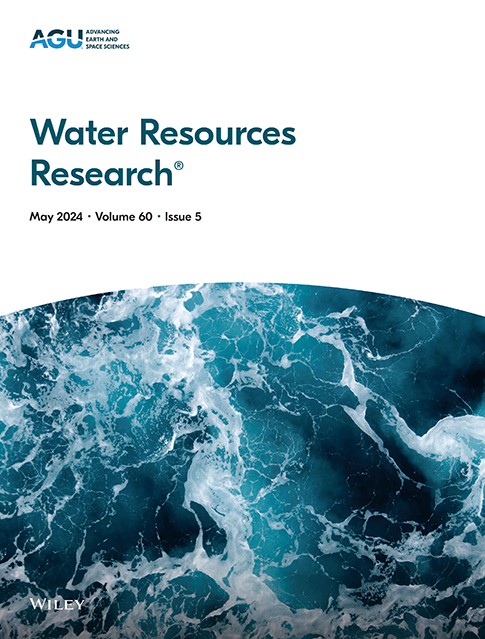Spectral Analysis of Hydrological Signals to Estimate Watershed Properties Considering Impacts of Unsaturated Zone
IF 5
1区 地球科学
Q2 ENVIRONMENTAL SCIENCES
引用次数: 0
Abstract
Understanding responses of stream discharge to precipitation in a watershed is important in gaining insights into watershed hydrology and estimating hydraulic parameters. Transfer functions in the spectral domain are commonly used to quantify the relationship between precipitation and discharge, and estimate watershed hydraulic parameters. However, previous models have not adequately accounted for the impact of the unsaturated zone. To address this, we have developed a novel analytical model that considers the effect of the unsaturated zone to obtain transfer functions within watersheds. These transfer functions are derived by the spectral method and verified through numerical simulations. The results indicate that the transfer functions are influenced significantly by the relative hydraulic conductivity exponent αk in the moisture characteristic curve. A higher αk results in a lower transfer function, indicating more robust filtering of hydrological signals. A thicker unsaturated zone results in lower transfer functions at higher frequencies. The traditional transfer functions, which neglect the retention capacity of the unsaturated zone, tend to overestimate hydrological responses at high frequencies. Our transfer functions agree well with integrated watershed-scale flow models and are also applied to observed data from four watersheds in Iowa, providing reasonable estimates for the hydraulic parameters. This study contributes to a deeper understanding of watershed behavior and offers an enhanced tool for estimating hydraulic parameters with practical applications.考虑非饱和带影响的水文信号光谱分析估算流域属性
了解流域内溪流排水量对降水的响应对于深入了解流域水文和估算水力参数非常重要。光谱域中的传递函数通常用于量化降水与排水之间的关系,并估算流域水力参数。然而,以往的模型没有充分考虑非饱和带的影响。为了解决这个问题,我们开发了一种新的分析模型,该模型考虑了非饱和带的影响,从而获得流域内的传递函数。这些传递函数是通过频谱法推导出来的,并通过数值模拟进行了验证。结果表明,传递函数受湿度特性曲线中相对水力传导指数 αk 的影响很大。αk 越大,传递函数越小,表明对水文信号的过滤越强。较厚的非饱和带会导致较高频率下的较低传递函数。传统的传递函数忽略了非饱和带的滞留能力,往往会高估高频率下的水文响应。我们的传递函数与综合流域尺度的水流模型非常吻合,也适用于爱荷华州四个流域的观测数据,为水力参数提供了合理的估计值。这项研究有助于加深对流域行为的理解,并为估算具有实际应用价值的水力参数提供了一个增强工具。
本文章由计算机程序翻译,如有差异,请以英文原文为准。
求助全文
约1分钟内获得全文
求助全文
来源期刊

Water Resources Research
环境科学-湖沼学
CiteScore
8.80
自引率
13.00%
发文量
599
审稿时长
3.5 months
期刊介绍:
Water Resources Research (WRR) is an interdisciplinary journal that focuses on hydrology and water resources. It publishes original research in the natural and social sciences of water. It emphasizes the role of water in the Earth system, including physical, chemical, biological, and ecological processes in water resources research and management, including social, policy, and public health implications. It encompasses observational, experimental, theoretical, analytical, numerical, and data-driven approaches that advance the science of water and its management. Submissions are evaluated for their novelty, accuracy, significance, and broader implications of the findings.
 求助内容:
求助内容: 应助结果提醒方式:
应助结果提醒方式:


